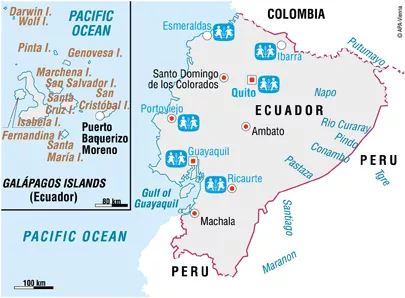
SOS relies on the kindness and generosity of Canadians to be able to provide a home for the most vulnerable children of around the world.
By becoming a child sponsor you are helping an individual child in need.
(You will receive a Canadian charitable tax receipt)
Please help us ensure a loving home for every child. Sponsor a child in South America now.
SOS Children's Villages in Esmeraldas
SOS Children’s Villages began its work in Esmeraldas in 1979. Today, the social centre here provides a family strengthening programme, which aims to alleviate hardship in the community. Its services include a childminding programme that enables working parents and single mothers to leave their children in safe hands while they are out making a living. Day-care for babies and medical care are also provided at the centre, and all services are open to the community.

For children in Esmeraldas who are unable to live with their parents, twelve SOS families can provide a loving home for up to 108 children. They live with their brothers and sisters and are affectionately cared for by their SOS mother.
When young people are ready to leave their SOS family in order to complete their secondary education or vocational training, two shared houses (one for boys and one for girls) are provided by our SOS Youth Programme in urban Esmeraldas. With the support of qualified counsellors, young people can plan their futures, increasingly take responsibility and prepare for independent life.
Despite improvements in recent years, Ecuador remains a country of deep-seated inequality
Esmeraldas is a coastal city in the far north-west of Ecuador, near the Colombian border. It has a population of roughly 150,000, a large proportion of which is Afro-Ecuadorian. The city is an important seaport in the region, particularly for lumber. Agriculture and one of the country’s largest oil refineries are also integral to the local economy.
In Ecuador, as in the rest of the Americas, people of African descent arrived in the country as slaves. The formation of an Afro-Ecuadorian identity was therefore a difficult and painful road, and to this day prejudice, social exclusion and discrimination continue to exist. The number of Afro-Ecuadorians who complete higher education or are in positions of power in the country is still very low.
Poverty and crime endanger the healthy development of children
The region's proximity to the Colombian border means that a lot of drug trafficking activity goes on here. This has a devastating effect on the safety of children, especially in poor families, where the lure of easy money puts many at risk of becoming entangled in criminal activities.
Although Ecuador has been experiencing progress in terms of human development, many people are still affected by high levels of poverty. Esmeraldas Province is one of the regions with the highest HIV/AIDS rates in the country, and new infections are still on the rise. Up to 40 per cent of the population here do not have access to clean drinking water, up to 50 per cent have no sanitation, and over 50 per cent are not able to satisfy basic needs such as food. In rural areas only 40 per cent have electricity, according to government estimates.
Such conditions can lead to stigmatisation of children early on in life, or they may miss out on education because they have to contribute to the family income. The efforts of SOS Children’s Villages are directed towards ensuring a stable home, a healthy upbringing and an education for children without parental care.
Our Impact
Image

SOS Social Centres in Ecuador aim is to help families, in particular women and children, living in communities neighbouring the SOS Children's Villages to gradually escape from poverty, and to help young people become self-reliant. |
2 SOCIAL CENTRES | 1165 Beneficiaries |
Image
The SOS Children's Village in Ecuador provides loving homes to orphaned and abandoned children |
1 VILLAGES | 92 Orphaned and Abandoned Children |
Image
The SOS Youth Facilities in Ecuador provides youth with a loving environment where they learn to transition into independent living and to expand their education |
2 YOUTH FACILITIES | 51 Youths in our Care |
Our Impact

